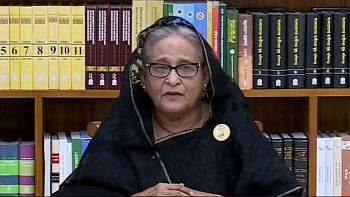Asia’s factories end 2024 on weak footing

Asia's factory powerhouses ended 2024 on a soft note as expectations for the New Year soured amid growing trade risks from a second Donald Trump presidency and China's fragile economic recovery.
A series of manufacturing purchasing managers' indexes for December from across the region published on Thursday showed factory activity slowing in China and South Korea although there were some signs of a pickup in Taiwan and Southeast Asia.
US President-elect Trump has pledged to impose big tariffs on imports from three major trading partners - Mexico, Canada and China - which are expected to in turn affect other large exporting nations and broader global business activity.
The Caixin/S&P Global manufacturing PMI for China nudged down to 50.5 in December from 51.5 the previous month, undershooting analysts' forecasts, indicating activity grew only modestly.
That echoed an official survey released earlier this week, which showed factory activity barely growing.
Gabriel Ng, assistant economist at Capital Economics, said Beijing's increased policy support in late 2024 provided a near-term boost to growth, which is likely to be seen in other fourth quarter indicators.
"And this improvement should carry over into early 2025," Ng said. "But the boost probably won't last more than a few quarters, with Trump likely to follow through on his tariff threat before long and persistent structural imbalances still weighing on the economy."
Elsewhere in Asia, South Korea's PMI showed activity shrinking in December and the decline in output gathering pace, a stark contrast to better-than-forecast export growth figures released on Wednesday.
South Korea's central bank governor said on Thursday the pace of monetary policy easing would need to be flexible this year due to heightened political and economic uncertainty.
In addition to global trade uncertainty, South Korea is dealing with the hit to business confidence from a national political crisis after a failed bid by President Yoon Suk Yeol last month to impose martial law.
Earlier in the week, Japan's PMI showed activity shrinking, albeit at a slower pace in December.
India's manufacturing activity grew at its weakest pace for 2024, its PMI showed, although the South Asian economy's factories continued to outperform regional peers, reporting uninterrupted expansion for the past three-and-a-half years.
Malaysia and Vietnam also reported declines in factory activity.
Taiwan was a rare bright spot, with activity growing at the fastest pace in five months with PMI survey respondents reporting strong sales in Asia, Europe and North America.
And in Singapore, considered a bellwether for global trade, official data showed the city-state grew at its fastest annual pace since the pandemic in 2024, helped in part by a rush to export before expected new US tariffs take effect.


 For all latest news, follow The Daily Star's Google News channel.
For all latest news, follow The Daily Star's Google News channel. 



Comments